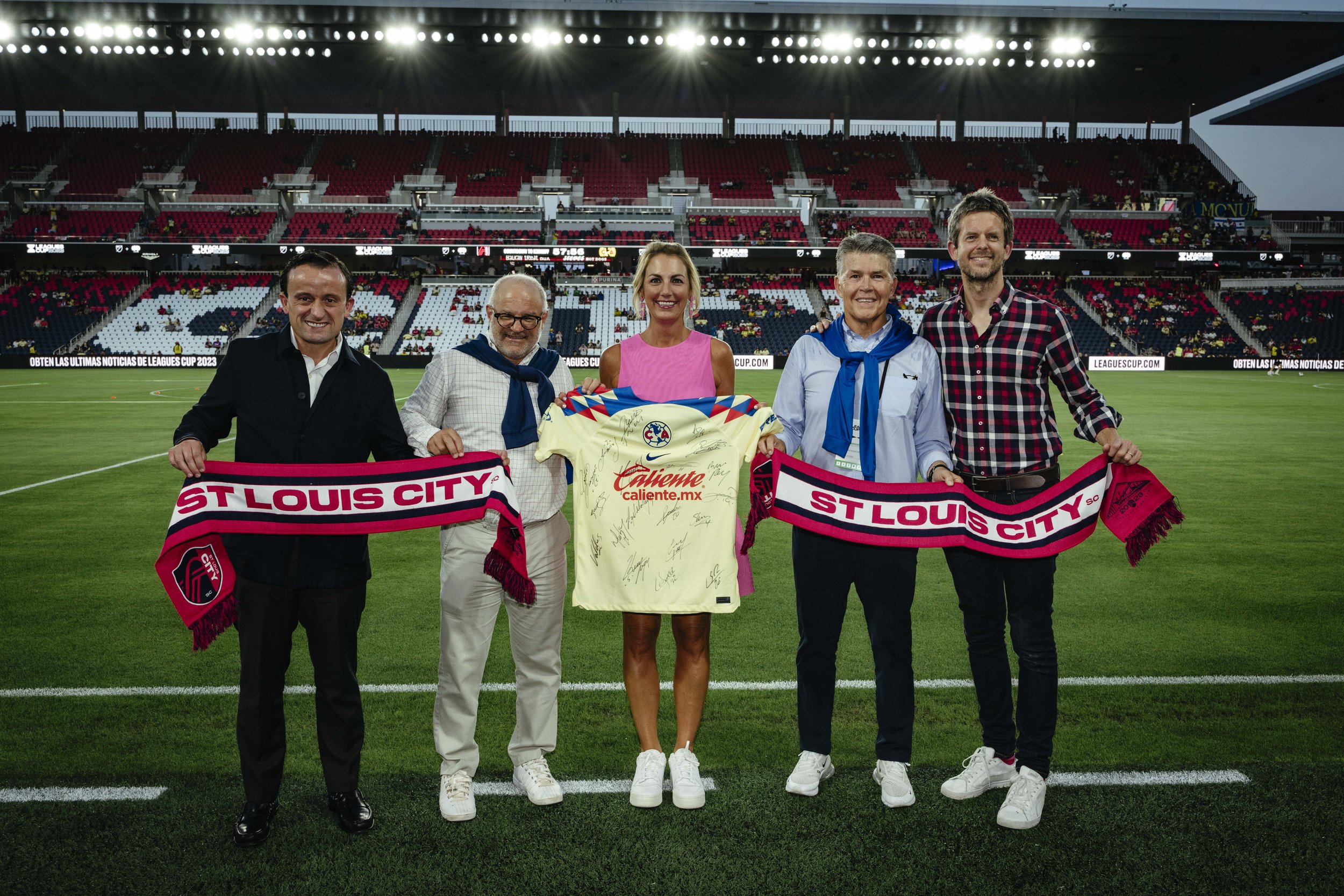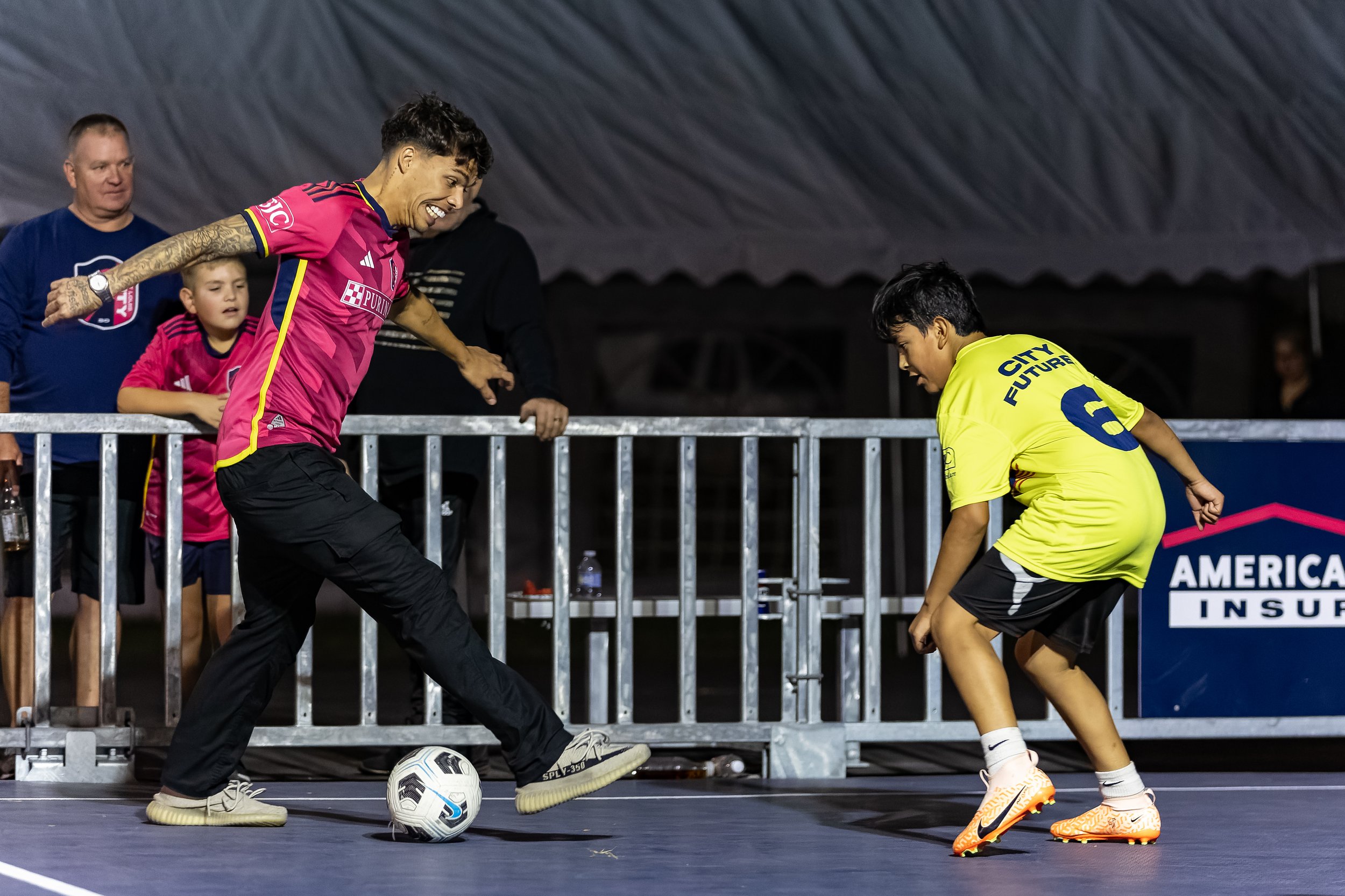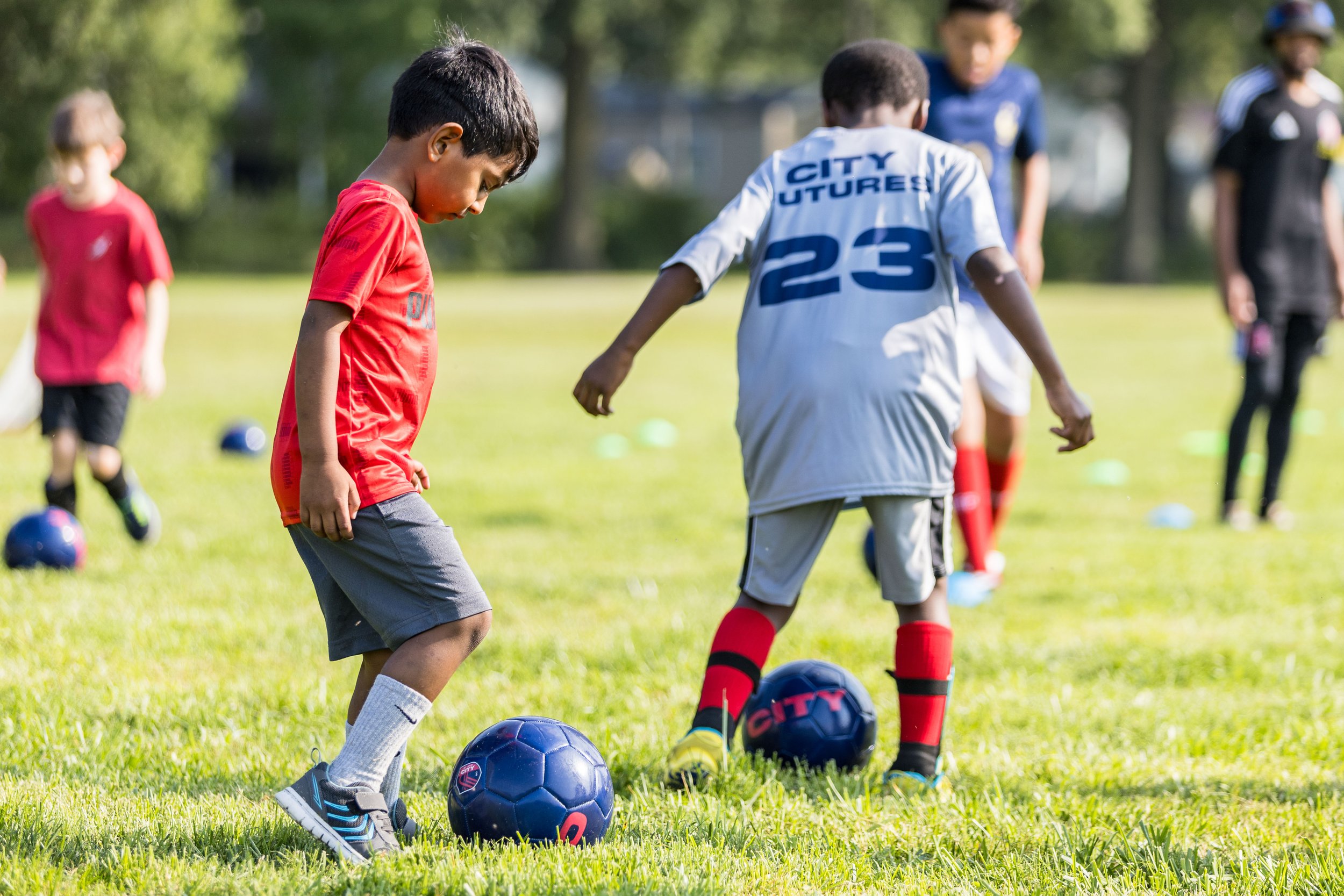Pitch Perfect
Mini-Pitches Are Bigger Than Soccer
By Craig Kaminer / Photos courtesy of St. Louis City SC
Unless you’re a Major League Soccer aficionado, you may not know soccer fields are called pitches. I didn’t the first time I went to a St. Louis CITY SC match (and by the way, games are called matches) so now you’re already ahead of where I was just a year ago. Since then I have seen some games, fallen in love with our stadium, bought some CITY swag, regularly watch our team on AppleTV, and have started acting like a character on “Ted Lasso” every chance I get. If you’ve never been to a game, go before you can’t get a seat.
For anyone who wondered if soccer would take off in St. Louis, the proof is in the numbers. Every home game sold out in the first year and St. Louisans have caught on quickly. Just follow the crowd, inside or outside the stadium, and you’ll feel the electricity. Don’t plan on sitting; most fans stand the whole game!
But the team and its ownership aren’t resting on their laurels after a successful first year in terms of its winning season, the first time for a new team to make the playoffs, and a record number of fans. CITY SC is doubling down on its commitment to soccer in St. Louis and have announced plans to partner with American Family Insurance, the U.S. Soccer Foundation, and Musco Lighting (the club’s stadium lighting partner and creator of the Mini-Pitch System™) to install 11 mini-pitches across the region to provide safe places for kids to learn and play soccer.
Fairmont City CITY Futures players at the Fairmont City Mini Pitch Unveiling on October 26, 2023.
If you have ever traveled to a country where soccer is a national pastime, you have certainly seen the range of pitches they play and practice on – from schoolyards, dirt fields, soccer parks with multiple pitches, and, of course, some very large stadiums. Soccer is an addiction, so players will play wherever they can find a field and a goal.
CITY CEO Carolyn Kindle and (far right) President and GM Diego Gigliani with executives of Liga MX at the July 27, 2023 Leagues Cup match against Club America.
According to CITY SC President and GM, Diego Gigliani, “The mini-pitch program is really just one example under the overarching vision and mission for the club, which has to do with the St. Louis community. And we keep on reinforcing that the club was founded to dream bigger than soccer. What that means is that the goal of the ownership group was always to have an impact, not just on the sport but also on the community, on the city, for it to be a catalyst for change and a representative of the future of St. Louis rather than the past. The phrase that we use a lot internally is that our goal is ‘to be an exceptional club and an exceptional neighbor.’ So there are many different ways in which we try to bring that to life.”
Rendering of CITY SC mini-pitch presented by American Family Insurance and U.S. Soccer.
The club committed early on to a goal of making sure that the sport of soccer or football could be more accessible across the St. Louis region. That involved two things that have now come together. One is the CITY Futures program and the other is the mini-pitch program.
CITY Futures is a youth soccer initiative focused on the 7-to-12 year old age group and on free football classes to kids across the St. Louis region with a special emphasis on those regions that today wouldn't have access to free soccer.
CITY SC defender Kyle Herbert playing with a future star at Fairmont City, Mini Pitch, October 2023.
“So CITY Futures has five outdoor locations where we coach kids and as of 2024, we will start adding some programming to the two mini-pitches that have been inaugurated,” Gigliani says. “That programming may be some CITY Futures coaching classes or maybe a street soccer tournament.”
Kcikstart CITY Futures.
The mini-pitch program is a commitment made by CITY SC, American Family Insurance, U.S. Soccer Foundation, and Musco Lighting (the club's stadium lighting partner and creator of the Mini-Pitch System™). The goal is for all 11 pitches to be installed and ready before the FIFA World Cup in 2026.
CITY Futures Kickstart clinic at Forestwood Park in Ferguson.
Two of the 11 mini-pitches were built and opened in 2023: the first in DeSoto Park, very close to the stadium, and the other in Fairmont City, Illinois. The third one is still under construction in Ferguson, MO.
So what’s the difference between a full-sized pitch and a mini-pitch? A regulation or full-sized pitch like the one at CITYPARK is between 110 and 120 yards long, and 70 to 80 yards wide, and accommodates 22 players and four officials. Typically, a player runs up to 10 miles per game on a field this size. The size of the mini-pitch is typically around 50 x 100 feet and is designed to be perfect for five or six-players-a-side. The mini-pitch resembles futsal, which is indoor soccer that accommodates five, six or seven players on each side. The benefits of a smaller pitch are multiple.
CITY Futures players participating in CITY Cup presented by World Wide Technology in April 2023.
“One of them is just the ability to put them in more places,” Gigliani says. “Obviously putting a full-size soccer pitch is really difficult to do, especially if you want to locate it close to urban centers where you've got a lot of people. Unlike pickleball, which is relatively new, the concept of a small soccer pitch is not new at all. It is just there to encourage this kind of street football culture. That's how some of the best soccer players in the history of the sport were made. These small pitches encourage a more technical way of playing because you are trying to play soccer in a more limited space, which requires more dribbling and more passing rather than the more physical running of a big 11-a-side pitch.”
CITY SC Midfielder Celio Pompeu playing with Fairmont City CITY Futures players at the Fairmont City Unveiling on October 26, 2023.
Fairmont City Mini-Pitch Kyle Hiebert.
Fairmont City CITY Futures players at the City Min-Pitch on October 26, 2023.
CITY SC hopes there will be some structured programming at the pitches such as leagues. But currently, they're meant for unstructured play. The success of the mini-pitches will be measured on them being used and being well-received by the community. The more people that are playing, the better. Diego emphasizes, “The long-term desire for this would be for us to be able to point back to the role that these mini-pitches have played in developing future players who could eventually even go into the professional group. Obviously that would be an amazing proof of success if by having some of these pitches in a community that today doesn't have it but has people who want to play, they can fall in love with the sport.
Kickstart CITY Futures.
Kcikstarty CITY Futures Ferguson.
“This is for all ages to play there, but you can imagine young kids having a football pitch nearby when they have a park nearby and they just start to get more involved with the sport,” Diego adds. “And we think there's a lot of potential in the city to produce top talent. So hopefully we'd be able to see five, 10 years from now some player who comes into our academy system. Our academy system doesn't start until you're 14 years old. Wouldn't it be great if kids who started playing on some of those mini-pitches when they saw them open in their neighborhood? That would be an amazing long-term proof of success.”
When asked what kind of formal programming is planned, Diego says that some of it will be up to the community to take ownership of those pitches. That is why CITY SC works closely with those communities to identify where to put them. “We want to put them someplace where the community wants them and then act on that and create some of their own programming. “But we will also support that with our CITY Futures programming. Obviously, the more kids that are playing at a younger age and the more that they're playing and learning the right way of playing soccer, the better our talent pool will be at 13 or 14.”
WWT City Cup.
CITY Futures Kickstart clinic at Forestwood Park in Ferguson.
CITY SC doesn’t currently plan on building any full-sized pitches. The mini-pitches have different size options when the club purchases them. One of the pitches that is being looked at in North City will be the largest mini-pitch possible. “So I don't know how the adjective ‘mini' will actually work for it, but it won't be an 11-a-side pitch, Diego says. “It will still be smaller than a traditional soccer field.”
Since the launch of CITY SC , the ownership group has become the largest developer in the Downtown West area. Specifically, the parts that they control in the CITYPARK Stadium district are: the stadium itself, the training facility, and now the opening of their offices, SoMa House. This is the renovation of a building where over 100 people work every day. But beyond that, Diego adds “We're excited that the stadium district has acted as a catalyst for investments into other real estate development projects. I think between what we have invested in the stadium district and other projects that have been announced since we were given the license for the MLS Club, there have been nearly a billion dollars worth of investment into this area including housing projects, restaurants, hotels, more retail and office space. All of that is a really big measure of success. Hopefully, we will help to further develop the core of the city.”
WWT City Cup.
Since I arrived in St. Louis in 1988, there has been talk of how to create a renaissance Downtown. Every other city surrounding us – such as Indianapolis, Nashville, and Austin – has a family or group of families that sponsor the growth. More than money, it takes selfless individuals with vision and the willingness to dream big. With the Taylors of Enterprise, Jim Kavanaugh of World Wide Technology, and others we have both the money and the vision. You can see the city change before your eyes, and before long, our kids will dominate the amateur and professional pitches worldwide. Thank you! St. Louis is indebted to you.
Diego Gigliani is originally from Argentina, was raised across the United States and Europe and spent the last 10 years with City Football Group, the largest global football organization in the world and the parent company of English Premier League powerhouse Manchester City FC. In his most recent role, Gigliani oversaw eight of City Football Group’s international football clubs, including all those in the European Union and Latin America covering markets such as Spain, Italy, France and Uruguay, to name a few. He sat on the Board of Directors of most of these clubs and worked directly with each club CEO and Sporting Director to set targets, provide direction, drive strategic projects, pursue synergies, and deliver results. Prior to the City Football Group, Gigliani spent 13 years in management consulting and completed his MBA at the Wharton School in the U.S.
















